By calling this number, you consent to receive a follow-up text message from Erosion Control Direct if the call is missed
By calling this number, you consent to receive a follow-up text message from Erosion Control Direct if the call is missed
Dewatering Bags | Products
Dewatering Bags: Efficient Water Management Solutions
Dewatering Bags
Products
Dewatering Bags: Efficient Water Management Solutions
Enhanced Water Filtration with Dewatering Bags
Protect your project with our high-quality dewatering bags, crucial for effective sediment control and enhanced water filtration. Our products meet stringent industry standards, ensuring your site complies with erosion control regulations.
Explore our full range of erosion control solutions on our home page. Boost your environmental management practices by integrating our dewatering bags with established Best Management Practices (BMP).
Dewatering Bags Benefits
Key Advantages of Utilizing Dewatering Bags

Our Dewatering Bag Products
Dewatering Bag Solutions Designed for Effective Erosion Control
Dewatering Bags
Optimized for maximum effectiveness, our dewatering bags offer reliable sediment filtration in demanding environments
GGS 8.0 Dewatering Bag - needle-punched nonwoven geotextile made of 100% polypropylene staple fibers, which are formed into a random network for dimensional stability. GGS 8.0 Dewatering Bag resists ultraviolet deterioration, rotting, biological degradation, naturally encountered basics and acids. Polypropylene is stable within a pH range of 2 to 13. GGS Dewatering Bags can be manufactured any dimension from 2’ to 15’. A spout is included to install the pump hose.
Need a Quotation?
Click below to speak with one of our professionals
Guide to Using Dewatering Bags
Step 1: Site Assessment
Identify the Discharge Area: Choose a location for the dewatering bags that is stable, away from sensitive areas, and has adequate drainage to prevent runoff issues.Evaluate Water Volume and Sediment: Estimate the amount of water and type of sediment to choose the right size and type of dewatering bag.
Step 2: Preparation
Prepare the Surface: Ensure the area where you will place the dewatering bags is flat and clear of sharp objects that might puncture the bags.Position the Bags: Lay the dewatering bags on the prepared surface, near the discharge point but leaving enough room for connections and handling.
Step 3: Installation
Connect the Pump: Attach the discharge hose from the pump to the dewatering bag using the provided fittings. Ensure a secure and leak-proof connection to prevent sediment escape. Secure the Bags: If necessary, use stakes or sandbags to secure the dewatering bags in place, especially if you're working in windy conditions or on a slope.
Step 4: Operation
Begin Pumping: Start the pump slowly to allow the water to begin filling the dewatering bag. Gradually increase the flow rate, ensuring that the bag is not overwhelmed and that water filters through the fabric.Monitor the Process: Regularly check the inflow and outflow to ensure that the bag is functioning correctly and that the filtered water is clear of sediment.
Step 5: Maintenance
Inspect the Bags: Frequently inspect the bags for wear and tear or clogging. Clean the exterior of the bags if necessary to maintain permeability.Replace as Needed: Depending on the volume and type of sediment, the bags may fill up and need replacing. Plan for proper disposal according to local regulations.
Step 6: Disposal
Drain the Bags: Allow the bags to drain completely. Depending on their contents and local regulations, you may need to let them dry before moving.Dispose of the Contents: Dispose of the sediment in accordance with environmental regulations. If the sediment is non-toxic, it might be used for landscaping or other purposes.Recycle or Dispose of the Bag: Depending on the material of the dewatering bag and local recycling options, either recycle the bag or dispose of it as per local waste management guidelines.
Why Choose Our Dewatering Bags?
Choose Erosion Control Direct for your dewatering bags to ensure effective and efficient sediment management in your erosion control projects. Our dewatering bags are crafted from high-quality, durable materials designed to withstand rigorous environmental conditions, ensuring long-term usability and reliability.
At Erosion Control Direct, we prioritize environmental compliance and offer products that meet stringent industry standards. Our dewatering bags feature superior filtration capabilities, effectively trapping sediment while allowing clean water to pass through, which is essential for protecting local waterways and ecosystems.
Our expert team is on hand to provide guidance and support, helping you select the perfect product to meet your goals. Additionally, our competitive pricing and commitment to customer satisfaction make Erosion Control Direct the ideal choice for cost-effective erosion control solutions. By choosing our dewatering bags, you’re not just purchasing a product; you're investing in a partnership that supports the success and sustainability of your projects.
Featured Dewatering Bag Articles
From the Experts: Navigating the Landscape of Erosion Control

Understanding Erosion Control Costs: A Comprehensive Breakdown for Project Planning
Discover a comprehensive breakdown of erosion control costs for project planning. Learn about factors influencing costs, cost-effective methods, and expert insights for optimizing your erosion control... ...more
Erosion Control
July 17, 2024•9 min read
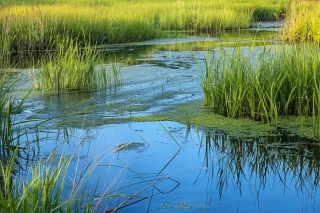
Preserving Delicate Ecosystems: Specialized Wetland Erosion Control Solutions
Discover specialized wetland erosion control solutions for preserving delicate ecosystems. Learn about bioengineering techniques, innovative approaches, and best practices for effective wetland protec... ...more
Erosion Control
July 17, 2024•9 min read

Protecting Our Woodlands: Top Forest Erosion Control Solutions and Strategies
Discover top forest erosion control solutions and strategies. Learn about reforestation, innovative techniques, and expert insights for protecting woodlands and preventing soil loss. ...more
Erosion Control
July 17, 2024•9 min read

Urban Erosion Management: Effective Solutions for City Landscape Challenges
Discover effective urban erosion management solutions for city landscape challenges. Learn about innovative techniques, best practices, and expert insights for sustainable urban development. ...more
Erosion Control
July 17, 2024•8 min read
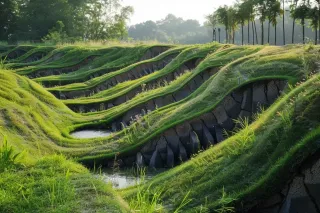
Emerging Trends: The Future of Erosion Control Solutions and Technologies
Discover the future of erosion control solutions and technologies. Learn about AI, drones, sustainable materials, and geosynthetics shaping the future of erosion control. ...more
Erosion Control
July 17, 2024•7 min read
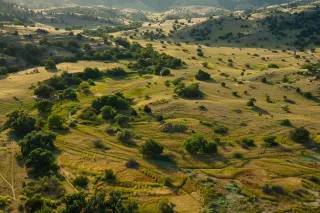
Decision-Making Guide: Selecting the Right Erosion Control Solutions for Your Project
Discover how to select the right erosion control solutions for your project. Learn expert strategies, innovative techniques, and product recommendations to ensure effective and sustainable erosion man... ...more
Erosion Control
July 17, 2024•9 min read

Preserving Natural Spaces: Erosion Control Solutions for Parks and Recreation Areas
Discover effective erosion control solutions for parks and recreation areas. Learn expert strategies, innovative techniques, and product recommendations to preserve natural spaces from erosion. ...more
Erosion Control
July 17, 2024•9 min read

Year-Round Protection: Seasonal Erosion Control Solutions for Changing Weather
Discover effective seasonal erosion control solutions for year-round protection. Learn expert strategies, innovative techniques, and product recommendations to combat erosion in changing weather condi... ...more
Erosion Control
July 17, 2024•8 min read
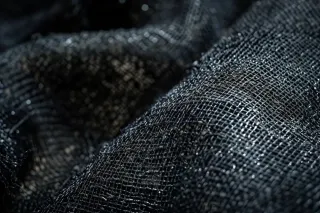
Investing in Durability: Long-Lasting Erosion Control Solutions for Persistent Protection
Discover long-lasting erosion control solutions for persistent protection. Learn expert strategies, innovative techniques, and real-world examples to ensure durable erosion control. ...more
Erosion Control
July 17, 2024•8 min read
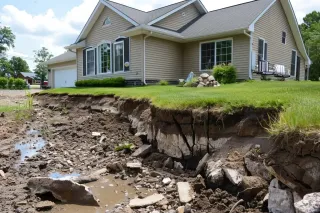
Homeowner’s Guide: Effective Residential Erosion Control Solutions and Techniques
Discover effective residential erosion control solutions and techniques. Learn expert strategies, innovative methods, and real-world examples to protect your home and landscape from soil erosion. ...more
Erosion Control
July 17, 2024•8 min read

Weathering the Storm: Top Erosion Control Solutions for High-Rainfall Regions
Discover top erosion control solutions for high-rainfall regions. Learn expert strategies, innovative techniques, and real-world examples to protect your land from soil erosion effectively. ...more
Erosion Control
July 17, 2024•9 min read
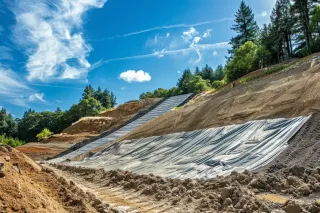
Maximizing Efficiency: Best Practices for Implementing Erosion Control Solutions
Discover best practices for implementing effective erosion control solutions. Learn expert strategies, innovative techniques, and real-world examples to maximize efficiency in protecting your land fro... ...more
Erosion Control
July 17, 2024•7 min read
Understanding Erosion Control Costs: A Comprehensive Breakdown for Project Planning
Discover a comprehensive breakdown of erosion control costs for project planning. Learn about factors influencing costs, cost-effective methods, and expert insights for optimizing your erosion control... ...more
Erosion Control
July 17, 2024•9 min read

Preserving Delicate Ecosystems: Specialized Wetland Erosion Control Solutions
Discover specialized wetland erosion control solutions for preserving delicate ecosystems. Learn about bioengineering techniques, innovative approaches, and best practices for effective wetland protec... ...more
Erosion Control
July 17, 2024•9 min read

Protecting Our Woodlands: Top Forest Erosion Control Solutions and Strategies
Discover top forest erosion control solutions and strategies. Learn about reforestation, innovative techniques, and expert insights for protecting woodlands and preventing soil loss. ...more
Erosion Control
July 17, 2024•9 min read

Urban Erosion Management: Effective Solutions for City Landscape Challenges
Discover effective urban erosion management solutions for city landscape challenges. Learn about innovative techniques, best practices, and expert insights for sustainable urban development. ...more
Erosion Control
July 17, 2024•8 min read

Emerging Trends: The Future of Erosion Control Solutions and Technologies
Discover the future of erosion control solutions and technologies. Learn about AI, drones, sustainable materials, and geosynthetics shaping the future of erosion control. ...more
Erosion Control
July 17, 2024•7 min read

Decision-Making Guide: Selecting the Right Erosion Control Solutions for Your Project
Discover how to select the right erosion control solutions for your project. Learn expert strategies, innovative techniques, and product recommendations to ensure effective and sustainable erosion man... ...more
Erosion Control
July 17, 2024•9 min read

Preserving Natural Spaces: Erosion Control Solutions for Parks and Recreation Areas
Discover effective erosion control solutions for parks and recreation areas. Learn expert strategies, innovative techniques, and product recommendations to preserve natural spaces from erosion. ...more
Erosion Control
July 17, 2024•9 min read

Year-Round Protection: Seasonal Erosion Control Solutions for Changing Weather
Discover effective seasonal erosion control solutions for year-round protection. Learn expert strategies, innovative techniques, and product recommendations to combat erosion in changing weather condi... ...more
Erosion Control
July 17, 2024•8 min read

Investing in Durability: Long-Lasting Erosion Control Solutions for Persistent Protection
Discover long-lasting erosion control solutions for persistent protection. Learn expert strategies, innovative techniques, and real-world examples to ensure durable erosion control. ...more
Erosion Control
July 17, 2024•8 min read

Homeowner’s Guide: Effective Residential Erosion Control Solutions and Techniques
Discover effective residential erosion control solutions and techniques. Learn expert strategies, innovative methods, and real-world examples to protect your home and landscape from soil erosion. ...more
Erosion Control
July 17, 2024•8 min read

Weathering the Storm: Top Erosion Control Solutions for High-Rainfall Regions
Discover top erosion control solutions for high-rainfall regions. Learn expert strategies, innovative techniques, and real-world examples to protect your land from soil erosion effectively. ...more
Erosion Control
July 17, 2024•9 min read

Maximizing Efficiency: Best Practices for Implementing Erosion Control Solutions
Discover best practices for implementing effective erosion control solutions. Learn expert strategies, innovative techniques, and real-world examples to maximize efficiency in protecting your land fro... ...more
Erosion Control
July 17, 2024•7 min read

FAQs
Your frequently asked dewatering bags questions answered
What are dewatering bags and how do they work?
Dewatering bags are sediment control devices used in construction, dredging, and environmental cleanup projects. They are made from a permeable fabric and designed to filter out sediment as water passes through, leaving the sediment contained within the bag.
Where should dewatering bags be used?
They are typically used at construction sites, near water bodies undergoing dredging, or at any project site where there is a need to remove sediment-laden water in a controlled manner. They help in maintaining water quality and complying with environmental regulations.
What materials are dewatering bags made from?
Most dewatering bags are made from a nonwoven, geotextile fabric that allows water to pass through while trapping sediment. The strength and permeability of the fabric can vary depending on the project requirements.
How are dewatering bags installed?
Dewatering bags should be placed on a stable, level area to prevent damage and tearing. The inflow hose from a pump is securely connected to the bag, allowing water to flow into the bag while trapping sediment.
Can dewatering bags be reused?
It depends on the specific product and sediment type. Some dewatering bags are designed for multiple uses, while others are intended for single use only. Always check the manufacturer's recommendations regarding reuse.
How do you dispose of dewatering bags after use?
Disposal should follow local regulations concerning sediment disposal. Typically, the sediment needs to dry before it can be disposed of as fill material or in a landfill, and the empty bags can be recycled or disposed of according to their material.
What are the environmental benefits of using dewatering bags?
Dewatering bags help reduce sediment and pollutant loads in stormwater, enhancing water quality and reducing impacts on nearby streams, rivers, and lakes. This makes them an environmentally friendly option for managing site runoff.
How do you choose the right size and type of dewatering bag for your project?
Selecting the right bag depends on several factors including the volume of water to be treated, the type of sediment, and the flow rate. Consulting with a specialist or the supplier can provide guidance based on specific project needs.
What maintenance is required for dewatering bags during their use?
Regular inspections should be conducted to ensure that the bags are not tearing or overflowing. It’s also important to monitor for clogging and replace the bags when they reach capacity to maintain efficiency.
Are there any safety considerations when using dewatering bags?
Yes, ensure the setup area is secure and stable, and that all connections are tight to prevent leaks. Also, handle filled bags carefully as they can be heavy and difficult to move.

Facebook